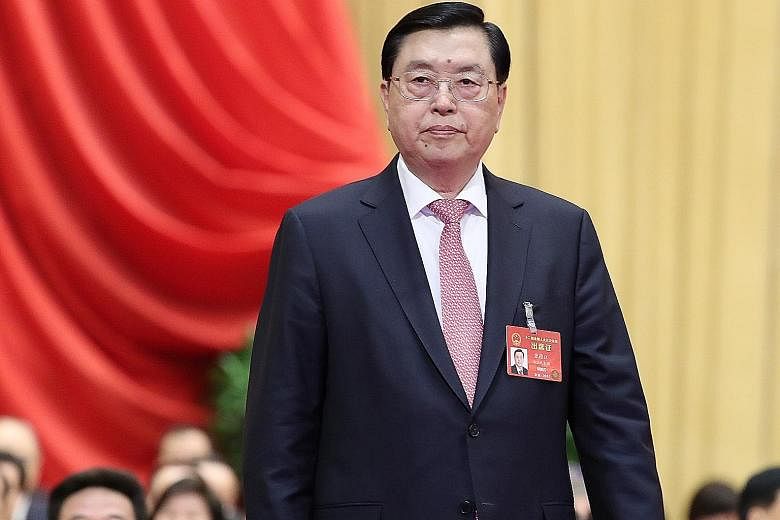Beijing will not tolerate any attempt at Hong Kong independence and regards such activity as a serious violation of the "one country, two systems" principle, China's parliamentary chief has warned.
In a clear warning ahead of protests aimed at disrupting Hong Kong's chief executive election later this month, Mr Zhang Dejiang told the National People's Congress (NPC), China's Parliament, yesterday that Beijing will not brook any attempt at secession.
Mr Zhang, China's No. 3 leader and its top official for Hong Kong affairs, cited Beijing's ruling on Hong Kong's mini-Constitution, known as the Basic Law, as a key accomplishment of the NPC last year.
In November, the NPC's top body issued an interpretation of a clause that governs oath-taking by legislators, stating that public officials have to take their oath of office "sincerely" and "solemnly" or face disqualification.
The ruling followed an incident where two newly elected pro-independence lawmakers in Hong Kong swore allegiance to a "Hong Kong nation" and insulted China during their oath-taking.
Mr Sixtus Leung, 30, and Ms Yau Wai Ching, 25, subsequently lost their seats but the debacle sparked massive protests in the city.
Yesterday, Mr Zhang said Beijing's interpretation "embodies the firm will of 1.3 billion Chinese people, including those in the Hong Kong region, to safeguard their country's sovereignty, security and developmental interests".
His remarks, which came three days after Premier Li Keqiang warned that calls for Hong Kong independence "will lead nowhere", hint at a growing unease on the mainland over the nascent pro-democracy movement in the city.
Fears that Beijing is increasingly interfering in the governance of the semi-autonomous financial hub - and in the March 26 election - have in recent days sparked fresh calls for self-determination that angered the Communist Party.
China also intends to pass a national intelligence law this year, Mr Zhang told NPC delegates.
There were no details about the proposed law or when it might be passed, but China had said in December that such legislation was needed to "increase and guarantee national intelligence and protect national security and interests".
China already has broad laws governing state secrets and security.
Last year, it adopted a controversial cyber security law to counter what the government says are growing threats such as hacking and terrorism.
In 2015, it adopted a sweeping national security law aimed at making all key network infrastructure and information systems "secure and controllable".
China will also update its 30- year-old general principles of civil law at this NPC meeting. The general provisions will provide an overarching framework for a Civil Code to protect the people's rights and property. The code, which will be made up of separate existing civil laws, will be ready by 2020.

